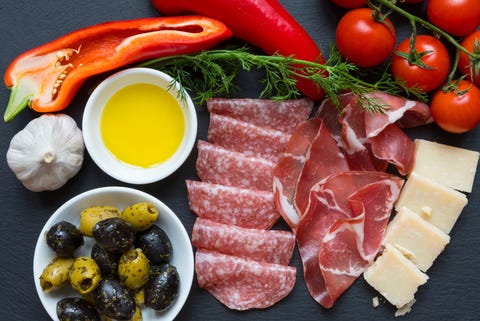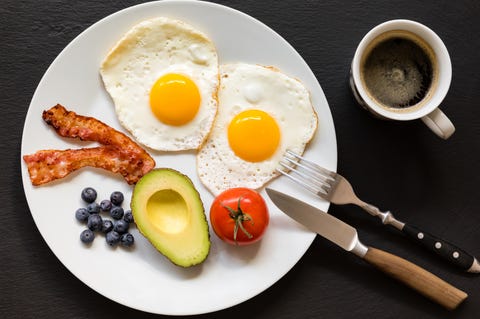How Much Magnesium Per Day on Keto Diet
Unlimited butter. All the avocado. Bacon in bulk. This seemingly "dream diet" is known as the ketogenic diet (keto for short), and promises those who partake the ability to eat delicious, fattening foods while still losing weight. It's gaining in popularity, and has been publicly endorsed by a number of high-profile celebrities, but what exactly is the keto diet?
"The keto diet is a high-fat, moderate-protein, and very low-carb way of eating that leads to ketosis, which is a metabolic process that shifts the body to utilize a different power source," Pamela M. Nisevich Bede, MS, RD, a registered dietitian at Abbott who specializes in sports nutrition, weight loss, and diet trends, tells Woman's Day. It's similar to the Atkins diet, but is even lower in protein and higher in fat. "Your body turns fat into fuel instead of running on easy-to-access carbs, which are its energy fuel source," Nisevich Bede explains. Note that this is only the case if you achieve a state of ketosis.
Is the keto diet a good fit for you? Are there any drawbacks you should be aware of? As with any diet or change in your nutrition or fitness regimen, it's important to speak with your doctor or physician before you consider jumping on the keto bandwagon. If you have discussed your options with a health care professional and would like to learn more, here's everything you need to know about this popular diet.
What is the keto diet?
The diet was originally discovered as a treatment for drug resistant epilepsy, Sarah Rueven, MS, RDN, CDN, and founder of Rooted Wellness, tells Woman's day. "But as the years have passed, people have discovered that it also helps with fat-burning," she adds.
Today, a few different variations exist, but the strict keto diet calls for 70 to 80% of calories from fat, 10 to 20% from protein, and 5 to 10% from carbs. Eating such a low amount of carbohydrates can be hard. "It can be a difficult diet to maintain. From my research, the average person can't stick with it for more than 6 months," Rueven says. "It usually ends up being 20 grams of carbs or less. Twenty to 50 grams of carbs is what's stated for the diet but a lot of people need more carb restriction to achieve ketosis. Twenty grams is a large slice of bread or medium sized apple. Literally every carb counts in terms of achieving ketosis."
The typical American consumes about 52% of calories from carbs, 33% from fat, and 16% from protein, according to a study published in The American Journal of Clinical Nutrition. This macronutrient breakdown is fairly close to current dietary recommendations from the United States Department of Agriculture, which recommend 45 to 50% complex carbs, 20-35%

IGphotography Getty Images
What is ketosis and how do I know when I'm experiencing it?
"Ketosis occurs when ketones are present in the body," Nisevich Bede explains. "Ketones are normally present in small amounts during times of fasting, like right after you wake up. But when you're effectively following the keto diet, ketone levels are higher."
Technically speaking, you're in ketosis when your blood ketones are higher than 0.5 mmol/L, but the optimal level for fat-burning purposes is 1.5 to 3 mmol/L. Nisevich Bede says that seasoned keto dieters report that they can actually feel a difference in this state, citing that they're less hungry and experience mental clarity once they reach ketosis.
You may be able to tell that you're in ketosis by a change in your breath (many report halitosis, or bad breath, due to higher levels of the ketone acetone coursing through the body). You should also be mindful of some of the other side effects. "Getting towards ketosis, people can experience what's called 'keto fever', with side effects that include headaches, low energy, fever, and nausea," Rueven explains. "It's a big deal to put the body through something like this and I don't recommend it to most of my clients."
To see where you stand on the ketosis scale, you can test your ketone levels with a blood meter, breath monitor, or with urine strips, the latter of which works similar to a pregnancy test and generally costs less than a dime a piece.
What are the health benefits of the keto diet?
Initial research has found that the diet can help maintain lean muscle mass in active women — even as they shed pounds — and may also lead to increased appetite suppression. "A keto diet is an option for people looking to lose overall weight, lower fat mass, and even build muscle. As a dietitian who focuses on sports nutrition and weight loss, I also recommend it for my clients who need a strong break from their sugar cravings, as it lessens blood sugar spikes and the cravings that can accompany high sugar intake," Nisevich Bede says.
In addition to those in need of a sugar roller coaster reset, individuals with these conditions may particularly benefit from trying the keto diet:
- Polycystic Ovary Syndrome (PCOS)
- Type 2 diabetics
- Morbid obesity
- Epilepsy
- Alzheimer's disease
- Certain types of cancers
- Parkinson's disease
- Amyotrophic Lateral Sclerosis (ALS)
The use of the ketogenic diet for anything other than epilepsy is still very new — a quick search of clinicaltrials.gov reveals all of the conditions that keto is being studied for its effectiveness — various cancers, Alzheimer's, alcoholism, and even COVID-19.
If you're considering a keto regimen, consult with your doctor and/or dietitian before doing so, and have regular blood tests along the way to make sure cholesterol and other levels stay within healthy ranges.
"It's important to still think about your protein intake to help avoid muscle loss, too," Nisevich Bede says.
What can I eat on the keto diet?
Here's a breakdown of the percentage of each food group you should be consuming every day, as well as what kinds of foods are best to consume for this diet.
Carbs (5-10% of calories): Tomatoes, eggplant, asparagus, broccoli, cauliflower, leafy greens, cucumber, bell peppers, zucchini, celery, brussels sprouts.
Protein (10-20% of calories): Chicken (dark meat if possible), turkey (dark meat if possible), venison, beef, fish and seafood (especially fatty fish like salmon, sardines, tuna, and mackerel), pork, lamb, eggs, natural cheeses, unsweetened, whole milk plain Greek yogurt, whole milk ricotta cheese, whole milk cottage cheese.
Fat (70-80% of calories): Olive oil, avocado oil, olives, avocados, flaxseeds, chia seeds, pumpkin seeds, sesame seeds, nuts, natural, no-sugar-added nut butters.

IGphotography Getty Images
Are there any health concerns?
As with any eating plan, the keto diet is not the best choice for everyone, Nisevich Bede says. Talk to your doctor and/or dietitian before starting, and avoid the keto diet if you:
- Have a history of eating disorders
- Have Type 1 diabetes
- Are pregnant or nursing
- Have a disease that affects the kidneys, liver, pancreas, or gallbladder
- Have had bariatric surgery
Work closely with your doctor and/or dietitian while on the keto diet since there are some potential health concerns, such as increased risk for:
- Kidney stones
- Acid reflux symptoms, due to high fat intake
- Constipation, as a result of lower fiber intake
- High LDL (bad) cholesterol, since saturated fat consumption is high
- Lack of phytonutrients and antioxidants as well as dehydration, as plant-based foods become less common
Rueven also notes that of particular concern is how little research has been done on the keto diet and women. "A lot of research on the keto diet focuses on overweight and obese men. There isn't as much research for the keto diet and women, such as whether following the diet disrupts sex hormones," she says. "I don't recommend the keto diet for women who are trying to conceive, except if they have an insulin-sensitive metabolic disorder such as PCOS (polycystic ovary syndrome)."
Keto vs regular low carb diets.
It seems that while the keto diet might help you lose more weight initially, the end results are generally the same when compared to a low carb diet.
"We know how the keto diet affects epileptics, but we don't have as much of a research base on how the keto diet influences long-term weight loss," Rueven explains. "It appears that over time the benefits are the same as doing a low carb diet. May people experience a bigger weight loss in the beginning of the keto diet but this evens out in the end. This is due to the fact that it's mostly just water weight, not fat, that's initially lost. While this can be very encouraging in the beginning, many people feel frustrated once the weight loss slows down."
Keto alternatives.
There's a new diet that promises the same weight-loss results as the keto diet but with a healthier twist. "One thing I've come across in researching this is the Ketotarian diet," Rueven explains. "It's a mostly plant-based/pescatarian way of approaching keto diet so you can reap the benefits of keto without the drawbacks such as cardiovascular disease risk from too much saturated fat."
Unlike a typical keto diet that relies on animal products as a primary source of fat, the Ketotarian diet is a mostly plant-based diet that includes eggs, fish, shellfish and ghee. It is similar to the traditional keto diet in that less than 5% of calories come from carbs, 70-75% come from fat, and 20-25% from protein. The Ketotarian diet also focuses on sourcing organic foods whenever possible and avoiding seed oils such as corn and soybean due to their inflammatory effect.
This is a very new diet, so the research is out on its efficacy. Similar to the keto diet, it can be quite restrictive.
How to start.
To start the keto diet, you should first find an RD or doctor to work with. They'll be able to make sure that you're following the keto diet correctly, and also help determine whether you're actually in a state of ketosis. You should then buy the right foods (see above). Just make sure that you're still eating healthfully even while following such a high-fat diet.
Lastly, you'll want to talk with your loved ones to make sure that they understand your new eating plan, and come up with a list of foods that everyone can agree on.
Subscribe to Woman's Day today and get 73% off your first 12 issues. And while you're at it, sign up for our FREE newsletter for even more of the Woman's Day content you want.
Karla Walsh Karla Walsh is a Des Moines, Iowa-based freelance writer and level one sommelier who balances her love of food and drink with her passion for fitness.
This content is created and maintained by a third party, and imported onto this page to help users provide their email addresses. You may be able to find more information about this and similar content at piano.io
How Much Magnesium Per Day on Keto Diet
Source: https://www.womansday.com/health-fitness/nutrition/a25602767/what-is-keto-diet/
0 Response to "How Much Magnesium Per Day on Keto Diet"
Post a Comment